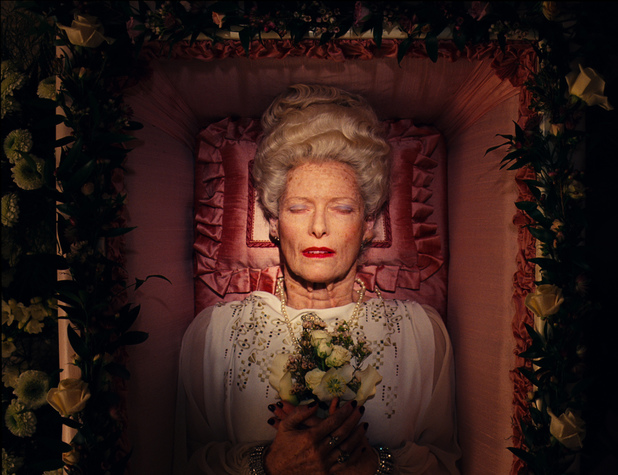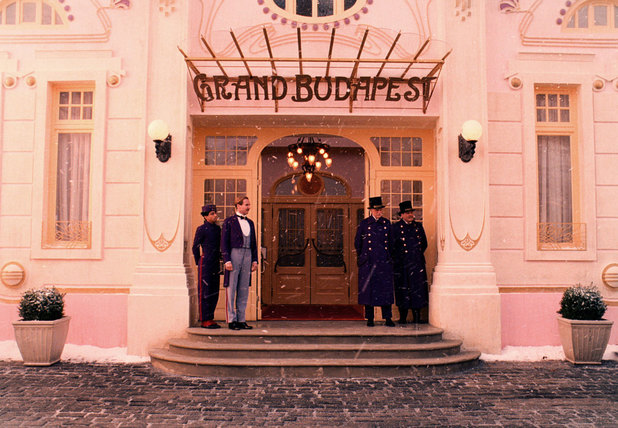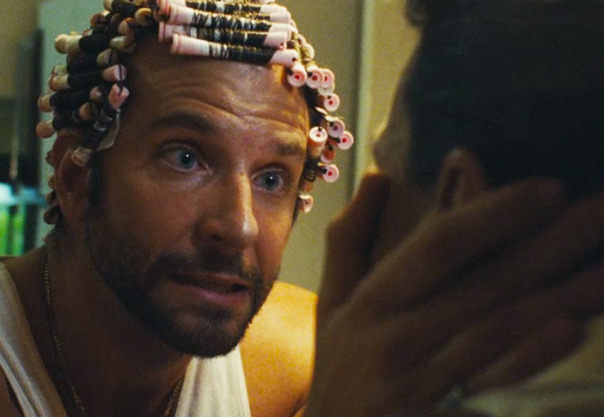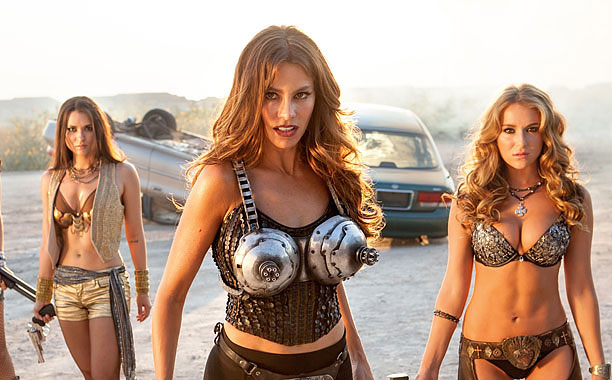The Grand Budapest Hotel
More wonderful whimsy from Wes, with Ralph Fiennes a humorous revelation
The beautifully adorned Grand Budapest Hotel is not only home to the fastidious, foul-mouthed concierge Gustave H. and his bellboy and confidante Zero but to a myriad of other fantastic characters. This is director Wes Anderson's candy coloured ode to the art of storytelling, and his tribute to the actors he's collaborated with and strong friendships he's forged via his illustrious filmmaking career. Anderson's eighth film is a warming, welcoming and, of course, whimsical comedy caper which whizzes by at a break-neck pace and is gifted with his signature air of melancholy.
This hotel is located in the fictional Republic of Zubrowka, found lodged between two countries at the precipice of war. The film begins in the 1980s where we meet the unnamed author of the titular novel (Tom Wilkinson), who explains that the story we are about to see unfold will be presented exactly as described to him back in the 60s. We are then taken back in time to meet the writer as a young man (now Jude Law) who is hearing Zero’s story first-hand in the dining hall of the Grand Budapest itself. Zero is played as an older man by F. Murray Abraham and his recollections take us back one final time, this time to the 30s where we get stuck into a murder mystery and meet Gustave (Ralph Fiennes), alongside Zero's beloved Agatha (Saoirse Ronan) who works at a small confectionary store.
 So a story within a story plays out and yet this detailed, layered and sprawling narrative has a lightness of touch thanks to its great sense of humour and Anderson’s passionate hand. He places the audience, for the most part, in the thick of it with Gustave and Zero as they try not only to solve the murder of Madame D. (one of Gustave’s elderly blonde lovers - played by Tilda Swinton in glorious prosthetics, as pictured above right), but as they break out of prison, steal some art and as they go on a perilous adventure.
So a story within a story plays out and yet this detailed, layered and sprawling narrative has a lightness of touch thanks to its great sense of humour and Anderson’s passionate hand. He places the audience, for the most part, in the thick of it with Gustave and Zero as they try not only to solve the murder of Madame D. (one of Gustave’s elderly blonde lovers - played by Tilda Swinton in glorious prosthetics, as pictured above right), but as they break out of prison, steal some art and as they go on a perilous adventure.
Anderson reaches into his vast pool of key players, including Bill Murray and Bob Balaban, who along with many others make up the Society of Cross Keys, a reliable group of international concierges who can be called up in times of need and who help out Gustave on his escapade. This loving nod pays tribute to the people who have helped Anderson along the way, yet entirely fits within the confines of this madcap yarn. Anderson has also acknowledged a debt to those directors from the golden age of Hollywood such as Ernst Lubitsch and Preston Sturges whose energy, verve and quick wittedness he so wonderfully emulates. And Anderson’s varied canon of influences also includes Austrian novelist Stefan Zweig, which explains the placing of the hotel atop a snowy mountain.
 The director's trademark meticulous long shots introduce you to the hotel, the varying colours of its corridors over time (which in its 60s setting has an unsettling Kubrickian feel) and its exuberant characters. He’s once again in a reflective mood switching between time periods and aspect ratios with his usual precision. And all this is fused together by a particularly brilliant and rare comedic turn from Fiennes as Gustave (who combines belters such as “I go to bed with all my friends” with po-faced expressions). He's paired with newcomer Tony Revolori as the young Zero - who looks up to this father figure of sorts - in a winning combination. Their relationship is depicted with both a deep solemnity at the tragedy of losses that haunt them and the brio of the British stiff upper lip, which Gustave extols with aplomb.
The director's trademark meticulous long shots introduce you to the hotel, the varying colours of its corridors over time (which in its 60s setting has an unsettling Kubrickian feel) and its exuberant characters. He’s once again in a reflective mood switching between time periods and aspect ratios with his usual precision. And all this is fused together by a particularly brilliant and rare comedic turn from Fiennes as Gustave (who combines belters such as “I go to bed with all my friends” with po-faced expressions). He's paired with newcomer Tony Revolori as the young Zero - who looks up to this father figure of sorts - in a winning combination. Their relationship is depicted with both a deep solemnity at the tragedy of losses that haunt them and the brio of the British stiff upper lip, which Gustave extols with aplomb.
Willem Dafoe is once again a menace with nasty gnashers, this time more vampiric like Max Schreck, rather than being in possession of rotting cheese-dusted dentals à la Bobby Peru in Wild at Heart. He’s henchman to a moustache-twirling Adrien Brody who adds a playfully macabre edge to the proceedings.
Ultimately The Grand Budapest Hotel is cinema at its most delightful, it rattles along right up to its abrupt ending which reminds us of the power of engrossing storytelling, how we might get swept up in the rush to get to the denouement, but that we never really want great stories to end.

 When Sydney, in the guise of the English Lady Edith, brings in new mark Richie DiMaso (
When Sydney, in the guise of the English Lady Edith, brings in new mark Richie DiMaso ( Lawrence is a doll and, for my money, she can have any supporting actress award she wants - but Adams is my pick here. Her Sydney is a complex creature: smart, vampy and, with her perma-plunging necklines, proudly sexual. Yet we also see that she's tortured by doubt and this vulnerability means that she's the most thinking, feeling thing about a film that deliberately and provocatively teeters on the brink of parody. And when you get them in a room together, wow. As Sydney emerges for a pivotal business meeting on the arm of Richie (from smoke no less!) she's met by the lipsticked snarl of Rosalyn - "I know who you are" she hisses. The atmosphere between these two extraordinary women crackles and spits like incendiary electrics.
Lawrence is a doll and, for my money, she can have any supporting actress award she wants - but Adams is my pick here. Her Sydney is a complex creature: smart, vampy and, with her perma-plunging necklines, proudly sexual. Yet we also see that she's tortured by doubt and this vulnerability means that she's the most thinking, feeling thing about a film that deliberately and provocatively teeters on the brink of parody. And when you get them in a room together, wow. As Sydney emerges for a pivotal business meeting on the arm of Richie (from smoke no less!) she's met by the lipsticked snarl of Rosalyn - "I know who you are" she hisses. The atmosphere between these two extraordinary women crackles and spits like incendiary electrics. Female roles are thankfully varied: Michelle Rodriguez (who, while we’re on the subject of a lack of decent roles for women in Hollywood, would be brilliant as Wonder Woman in the Justice League film when that happens) reappears in the role of Luz, who has moved from her taco truck to a warehouse as head of an underground resistance, now using technology to fight their battle.
Female roles are thankfully varied: Michelle Rodriguez (who, while we’re on the subject of a lack of decent roles for women in Hollywood, would be brilliant as Wonder Woman in the Justice League film when that happens) reappears in the role of Luz, who has moved from her taco truck to a warehouse as head of an underground resistance, now using technology to fight their battle.